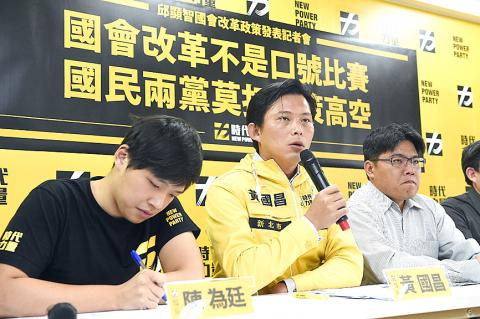New Power Party (NPP) legislative candidates yesterday castigated “insincere” Chinese Nationalist Party (KMT) proposals for reforming the Legislative Yuan, calling for meaningful restrictions on the legal role of cross-caucus negotiations as part of any reform package.
“It is fundamentally about manipulating the election and cheating votes out of people,” said NPP legislative candidate Chiu Hsien-chih (邱顯智), adding that the KMT’s legislative caucus had previously repeatedly rejected reforms similar to those proposed by Legislative Speaker Wang Jin-pyng (王金平) last week.
Chiu’s campaign manager, Chen Wei-ting (陳為廷), a prominent leader in last year’s Sunflower movement, called proposals by Wang “fake” and “non-democratic.”

Photo: Chen Chih-chu, Taipei Times
Wang last week called for drafting new legislation to clearly spell out committee hearing procedures along with other changes, calling on the Democratic Progressive Party (DPP) to present a competing proposal by Thursday, at the same inviting Chen and fellow Sunflower leader Lin Fei-fan (林飛帆) to meet and discuss legislative reform.
Chiu said Wang’s proposal would further increase the power of the legislative speaker and the different party caucus whips, to whom it would dedicate sole power to call cross-caucus negotiations, removing current legal provision allowing individual legislators to use a petition drive to initiate negotiations.
“Our main criticism of cross-caucus negotiations is that they are extremely authoritarian — concentrating power in the hands of a few, while diluting the power of individual legislators to exercise their legislative authority,” he said, adding that removing individual legislators power to call talks would be “taking a step in the wrong direction.”
Hsu Wei-chun (徐偉群), a professor of law at Chung Yuan University, said that under current rules, any results of cross-caucus negotiations are sent directly the legislative floor where they are passed automatically, unless eight or more legislators sign a petition requiring a vote. Speeches about the results can be made from the legislative floor only by party representatives designated by party leaders, he said.
Citizen’s Congress Watch executive director Chang Hung-lin (張宏林) said the secrecy of cross-caucus negotiations allows legislators to avoid taking a stance on controversial legislation, adding that its existence also discouraged legislators from investing time in budget reviews.
“Every time you work hard to conduct a review, if there is any disagreement, then a cross-caucus negotiation will be called — so what is the point of working hard to review every budget item? Our budget review process has already degenerated into cross-board cuts decided via cross-caucus negotiations,” he said.
Chiu called for use of cross-caucus negotiations to be limited to parliamentary procedure, such as agenda setting, rather than the specific content of bills.

DEFENSE: The National Security Bureau promised to expand communication and intelligence cooperation with global partners and enhance its strategic analytical skills China has not only increased military exercises and “gray zone” tactics against Taiwan this year, but also continues to recruit military personnel for espionage, the National Security Bureau (NSB) said yesterday in a report to the Legislative Yuan. The bureau submitted the report ahead of NSB Director-General Tsai Ming-yen’s (蔡明彥) appearance before the Foreign and National Defense Committee today. Last year, the Chinese People’s Liberation Army (PLA) conducted “Joint Sword-2024A and B” military exercises targeting Taiwan and carried out 40 combat readiness patrols, the bureau said. In addition, Chinese military aircraft entered Taiwan’s airspace 3,070 times last year, up about

Taiwan is stepping up plans to create self-sufficient supply chains for combat drones and increase foreign orders from the US to counter China’s numerical superiority, a defense official said on Saturday. Commenting on condition of anonymity, the official said the nation’s armed forces are in agreement with US Admiral Samuel Paparo’s assessment that Taiwan’s military must be prepared to turn the nation’s waters into a “hellscape” for the Chinese People’s Liberation Army (PLA). Paparo, the commander of the US Indo-Pacific Command, reiterated the concept during a Congressional hearing in Washington on Wednesday. He first coined the term in a security conference last

A magnitude 4.3 earthquake struck eastern Taiwan's Hualien County at 8:31am today, according to the Central Weather Administration (CWA). The epicenter of the temblor was located in Hualien County, about 70.3 kilometers south southwest of Hualien County Hall, at a depth of 23.2km, according to the administration. There were no immediate reports of damage resulting from the quake. The earthquake's intensity, which gauges the actual effect of a temblor, was highest in Taitung County, where it measured 3 on Taiwan's 7-tier intensity scale. The quake also measured an intensity of 2 in Hualien and Nantou counties, the CWA said.

The Overseas Community Affairs Council (OCAC) yesterday announced a fundraising campaign to support survivors of the magnitude 7.7 earthquake that struck Myanmar on March 28, with two prayer events scheduled in Taipei and Taichung later this week. “While initial rescue operations have concluded [in Myanmar], many survivors are now facing increasingly difficult living conditions,” OCAC Minister Hsu Chia-ching (徐佳青) told a news conference in Taipei. The fundraising campaign, which runs through May 31, is focused on supporting the reconstruction of damaged overseas compatriot schools, assisting students from Myanmar in Taiwan, and providing essential items, such as drinking water, food and medical supplies,